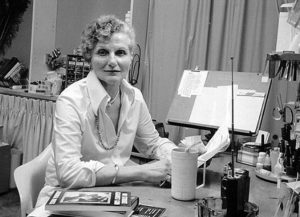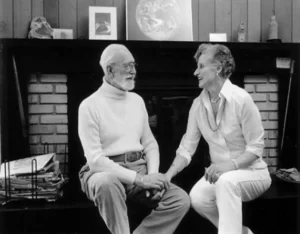I was just a teenager when I first read a novel by James Tiptree Jr. I loved the writing. It was wildly inventive, with a keen sense of injustice that put the excluded and marginalised at centre stage.

It wasn’t until some years later I discovered that James Tiptree Jr was actually a woman. Her real name was Alice Sheldon and her story was inspirational. She was a hero, a complex woman who broke all of the rules about how she should live and challenged all the gender conventions of her time. She adopted science fiction as her genre at a time when it was the almost sole preserve of men. Her concession to this male dominance was to write under the pseudonym ‘James Tiptree Jr’ (a common thing for women to do at the time)
“A male name seemed like good camouflage. I had the feeling that a man would slip by less observed. I’ve had too many experiences in my life of being the first woman in some damned occupation”
Alice Sheldon was born in 1915, five years before women were granted the vote in the US. As a child she travelled across India and Africa with her bohemian parents. She grew up and joined the army, and was recruited by the C.I.A, but she was also an artist, an experimental psychologist and in her later years an acclaimed author. As she grew older, she continued to write whilst dealing with increasingly severe and chronic depression and caring for her second husband, ‘Ting’ Sheldon.
Under her chosen pseudonym, she wrote two novels and sixty-eight short stories. She won two Hugo awards, three Nebula awards, two Locus awards, the World Fantasy Award and the Jupiter award. When rumours began to circulate that the award-winning James Tiptree Jr might actually be a woman, some of her fellow sci-fi writers were outraged. Robert Silverberg wrote:
“It has been suggested that Tiptree is female, a theory that I find absurd, for there is to me something ineluctably masculine about Tiptree’s writing”.
History doesn’t tell us how Silverberg reacted when Alice’s identity became public, but in 1991 her writing was recognised by the creation of an award in her name to acknowledge the role of science fiction in exploring alternative depictions of gender. The ‘James Tiptree Jr. Literary Award’ would be an annual prize for science fiction that explored our understanding of gender. Alice would have agreed wholeheartedly with its stated aim:
“not to look for work that falls into some narrow definition of political correctness, but rather to seek out work that is thought-provoking, imaginative, and perhaps even infuriating”
The award would go on to promote sci-fi by women that was exploratory and challenging, bringing new authors to public attention and much needed finance to struggling writers.
Despite her success, Alice Sheldon was deeply troubled and experienced recurring bouts of depression. She self-harmed as a young woman and was diagnosed with cyclothymia in her sixties. A rootless childhood and a dysfunctional relationship with her parents may have contributed to her feelings of hopelessness. Although she continued to write, she often contemplated suicide and, since she couldn’t imagine living or dying without her beloved Ting, she suggested that they make a suicide pact. Her husband agreed that they should die together when the time was right, but deferred the date. One friend believed he consented so that Alice would promise to stay alive: ‘yes, but it’s not time yet; later, not now.’
As the years passed, Ting’s health began to fail. He was 13 years older than Alice and by the age of 84 he was completely blind. Whilst Alice was a carer for Ting as he became more infirm, in turn Ting had always helped support Alice’s mental health. Some said that it was a blow to both of them that he was no longer able to care for her.
In May of 1987, Alice shot her husband while he was sleeping and then turned the gun on herself. Close family and friends stated that Ting had consented to this suicide pact, but there was no written evidence of his consent at the time of their death. The couple’s death was seen as tragic, but it wasn’t seen as an impediment to the creation of the Tiptree Award in 1991. Yet, without evidence of consent, the field was open for alternative narratives about the death of Ting Sheldon.
By 2019 controversy arose over the appropriateness of naming an award after Tiptree who was described as a “caregiver murderer”. The idea of a consensual suicide pact was dismissed in the light of Ting’s disability and increasing frailty. Comments on Twitter give a feel for the outrage that was being expressed:
“Sheldon as writer is not separable from Sheldon as murderer of a disabled person for ableist reasons. It cannot be explained away”.
“Is it appropriate to “honor” disabled writers – who have been nominees and winners – by an award named after someone who thought her own husband’s life was worthless and his desire to live didn’t matter?”
Initially, the ‘Motherboard’ of the James Tiptree Jr. Award resisted. On September 2nd 2019, they rejected requests to change the name. However, nine days later, they announced that the award would become the ‘Otherwise’ Award. They released the following statement about the change:
“Now, our community has spoken and said: there is too much discomfort over this history for many of us to feel joyous about this name. Keeping the joy is more important than keeping the name.”
The social media spotlight created polarisation and anger. Some saw Alice’s actions as ‘mercy killing’ or assisted suicide in opposition to the narrative of ‘caregiver murder’, but all seemed to miss the complexity of Alice and Ting’s relationship. As Julie Phillips, Alice’s biographer says:
“…the Sheldon’s relationship was very close in ways that were not entirely healthy, and within that mutual dependence the idea of suicide evolved over a long time, between two people of whom one, Ting, did not leave a statement of consent. This is a place of shadows….I resist imposing a false narrative of absolutes, either to excuse Alli or condemn her. ‘Murder’ is a heavy charge to put on someone without proof, I can’t accept it.”
All the narratives about the couple’s deaths either ignore or minimise the role of Alice’s depression. Both Alice and Ting were dealing with disabling conditions which were only bearable because of their mutual care.

Mental health issues are now classed as a disability in the UK and some people with long term mental health issues would argue they should have the right to kill themselves, if they choose. Many people with chronic and terminal illnesses also argue for the right to euthanasia or assisted suicide. Yet, for many disabled activists, the idea of assisted suicide is abhorrent, and the right to euthanasia has eugenic undertones. This situation shines a light on deep fractures between the perspectives of mental health and disabled activists.
In arguing for the removal of Alice’s pseudonym from the award, some also cited the precedent of the John W. Campbell Award for Best New Writer. In her acceptance speech, on receiving the award in 2019, the writer Jeannette Ng pointed out that Campbell was a known racist. In response, the award was swiftly renamed the Astounding Award. Comparisons were made with Alice Sheldon, yet Campbell had been was unashamed in expressing his views about race and I found it strange that a known racist and eugenicist should be compared to a woman with severe depression whose views in her lifetime were unusually progressive.
The case of Alice and Ting also speaks to the wider issue of naming and the construction of heroes. A friend said recently we shouldn’t have any named statues or awards, since all our heroes have feet of clay, and we simply shouldn’t have heroes. Yet where does that leave the marginalised and excluded, people who may need to see themselves represented? Is it enough to be represented through a concept – to be ‘Otherwise’ or ‘Astounding’? The need for a protagonist, to have someone to root for, seems to be in the human DNA, we struggle to understand the world without it. As the saying goes, ‘if you don’t see it you can’t be it’.
Despite her actions, I felt incredibly saddened by the loss of the Tiptree award. This seems like yet another in a long line of marginalised people who have been lost from history. Despite their feet of clay, I think we still have a need for heroes, but heroes who have human flaws, as well as being magnificent.
Meg Allen is a regular Asylum reader and lives in West Yorkshire.
This is a Sample Article from the Spring 2022 issue of Asylum (29.1).
To read more, subscribe to Asylum Magazine.
